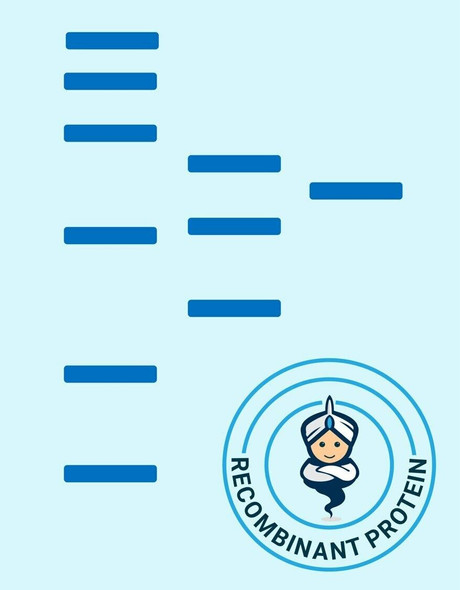Human FGFR3 Recombinant Protein (RPPB2521)
- SKU:
- RPPB2521
- Product type:
- Recombinant Protein
- Size:
- 10ug
- Species:
- Human
- Target:
- FGFR3
- Synonyms:
- CD333 Antigen
- HSFGFR3EX
- EC 2710
- CD333
- Source:
- Sf9 Insect cells
- Uniprot:
- P22607
Description
| Product Name: | Human FGFR3 Recombinant Protein |
| Product Code: | RPPB2521 |
| Size: | 10µg |
| Species: | Human |
| Target: | FGFR3 |
| Synonyms: | CD333 Antigen, HSFGFR3EX, EC 2.7.10, CD333, CEK2, ACH, Fibroblast Growth Factor Receptor 3, EC 2.7.10.1, FGFR-3, JTK4, Fibroblast Growth Factor Receptor 3 Variant 4, Achondroplasia, Thanatophoric Dwarfism, Hydroxyaryl-Protein Kinase, Tyrosine Kinase JTK4. |
| Source: | Sf9 Insect cells |
| Physical Appearance: | Sterile Filtered colorless solution. |
| Formulation: | FGFR3 protein solution (1mg/ml) contains Phosphate Buffered Saline (pH 7.4) and 10% glycerol. |
| Stability: | Store at 4°C if entire vial will be used within 2-4 weeks. Store, frozen at -20°C for longer periods of time. For long term storage it is recommended to add a carrier protein (0.1% HSA or BSA). Avoid multiple freeze-thaw cycles. |
| Purity: | Greater than 95.0% as determined by SDS-PAGE. |
| Amino Acid Sequence: | ESLGTEQRVV GRAAEVPGPE PGQQEQLVFG SGDAVELSCP PPGGGPMGPT VWVKDGTGLV PSERVLVGPQ RLQVLNASHE DSGAYSCRQR LTQRVLCHFS VRVTDAPSSG DDEDGEDEAE DTGVDTGAPY WTRPERMDKK LLAVPAANTV RFRCPAAGNP TPSISWLKNG REFRGEHRIG GIKLRHQQWS LVMESVVPSD RGNYTCVVEN KFGSIRQTYT LDVLERSPHR PILQAGLPAN QTAVLGSDVE FHCKVYSDAQ PHIQWLKHVE VNGSKVGPDG TPYVTVLKTA GANTTDKELE VLSLHNVTFE DAGEYTCLAG NSIGFSHHSA WLVVLPAEEE LVEADEAGSV YAGLEPKSCD KTHTCPPCPA PELLGGPSVF LFPPKPKDTL MISRTPEVTC VVVDVSHEDP EVKFNWYVDG VEVHNAKTKP REEQYNSTYR VVSVLTVLHQ DWLNGKEYKC KVSNKALPAP IEKTISKAKG QPREPQVYTL PPSRDELTKN QVSLTCLVKG FYPSDIAVEW ESNGQPENNY KTTPPVLDSD GSFFLYSKLT VDKSRWQQGN VFSCSVMHEA LHNHYTQKSL SLSPGKHHHH HH |
Fibroblast Growth Factors (FGFs) comprise a family of at least eighteen structurally realted proteins that are involved in a multitude of physiological and pathological cellular processes, including cell growth, differentation, angiogenesis, wound healing and tumorgenesis. The biological activities of the FGFs are mediated by a family if type I transmembrane tyrosine kinases which undergo dimerization and autophosphorylation after ligand binding. Four distinct genes encoding closely related FGF receptors, FGFR-1to -4 are known. Multiple forms of FGFR-1 to -3 are generated by alternative splicing of the mRNAs. A frequent splicing event involving FGFR-1 and -2 results in receptors containing all three Ig domains Only the alpha isoform has been identified for FGFR-3 and FGFR-4. Additional splicing events for FGFR-1 to -3, involving the C-terminal half of the IgIII domain encoded by two mutually exclusive alternative exons, generate FGF receptors with alternative IgIII domains (IIIb and IIIc). A IIIa isoform which is a secreted FGF binding protein containing only the N-terminal half of the IgIII domain plus some intron sequences has also been reported for FGFR-1. Mutations in FGFR-1 to -3 have been found in patients with birth defects involving craniosynostosis.
FGFR3 Human Recombinant produced in Sf9 Baculovirus cells is a single, glycosylated polypeptide chain containing 592 amino acids (23-375a.a.) and having a molecular mass of 65.1kDa (Molecular size on SDS-PAGE will appear at approximately 70-100kDa).FGFR3 is expressed with a 239 amino acid hIgG-His tag at C-Terminus and purified by proprietary chromatographic techniques.
| UniProt Protein Function: | Tyrosine-protein kinase that acts as cell-surface receptor for fibroblast growth factors and plays an essential role in the regulation of cell proliferation, differentiation and apoptosis. Plays an essential role in the regulation of chondrocyte differentiation, proliferation and apoptosis, and is required for normal skeleton development. Regulates both osteogenesis and postnatal bone mineralization by osteoblasts. Promotes apoptosis in chondrocytes, but can also promote cancer cell proliferation. Required for normal development of the inner ear. Phosphorylates PLCG1, CBL and FRS2. Ligand binding leads to the activation of several signaling cascades. Activation of PLCG1 leads to the production of the cellular signaling molecules diacylglycerol and inositol 1,4,5-trisphosphate. Phosphorylation of FRS2 triggers recruitment of GRB2, GAB1, PIK3R1 and SOS1, and mediates activation of RAS, MAPK1/ERK2, MAPK3/ERK1 and the MAP kinase signaling pathway, as well as of the AKT1 signaling pathway. Plays a role in the regulation of vitamin D metabolism. Mutations that lead to constitutive kinase activation or impair normal FGFR3 maturation, internalization and degradation lead to aberrant signaling. Over-expressed or constitutively activated FGFR3 promotes activation of PTPN11/SHP2, STAT1, STAT5A and STAT5B. Secreted isoform 3 retains its capacity to bind FGF1 and FGF2 and hence may interfere with FGF signaling. |
| NCBI Summary: | This gene encodes a member of the fibroblast growth factor receptor (FGFR) family, with its amino acid sequence being highly conserved between members and among divergent species. FGFR family members differ from one another in their ligand affinities and tissue distribution. A full-length representative protein would consist of an extracellular region, composed of three immunoglobulin-like domains, a single hydrophobic membrane-spanning segment and a cytoplasmic tyrosine kinase domain. The extracellular portion of the protein interacts with fibroblast growth factors, setting in motion a cascade of downstream signals, ultimately influencing mitogenesis and differentiation. This particular family member binds acidic and basic fibroblast growth hormone and plays a role in bone development and maintenance. Mutations in this gene lead to craniosynostosis and multiple types of skeletal dysplasia. [provided by RefSeq, Aug 2017] |
| UniProt Code: | P22607 |
| NCBI GenInfo Identifier: | 120050 |
| NCBI Gene ID: | 2261 |
| NCBI Accession: | P22607.1 |
| UniProt Secondary Accession: | P22607,Q14308, Q16294, Q16608, Q59FL9, D3DVP9, D3DVQ0 |
| UniProt Related Accession: | P22607 |
| Molecular Weight: | 85,083 Da |
| NCBI Full Name: | Fibroblast growth factor receptor 3 |
| NCBI Synonym Full Names: | fibroblast growth factor receptor 3 |
| NCBI Official Symbol: | FGFR3 |
| NCBI Official Synonym Symbols: | ACH; CEK2; JTK4; CD333; HSFGFR3EX |
| NCBI Protein Information: | fibroblast growth factor receptor 3 |
| UniProt Protein Name: | Fibroblast growth factor receptor 3 |
| UniProt Synonym Protein Names: | CD_antigen: CD333 |
| Protein Family: | Fibroblast growth factor receptor |
| UniProt Gene Name: | FGFR3 |










